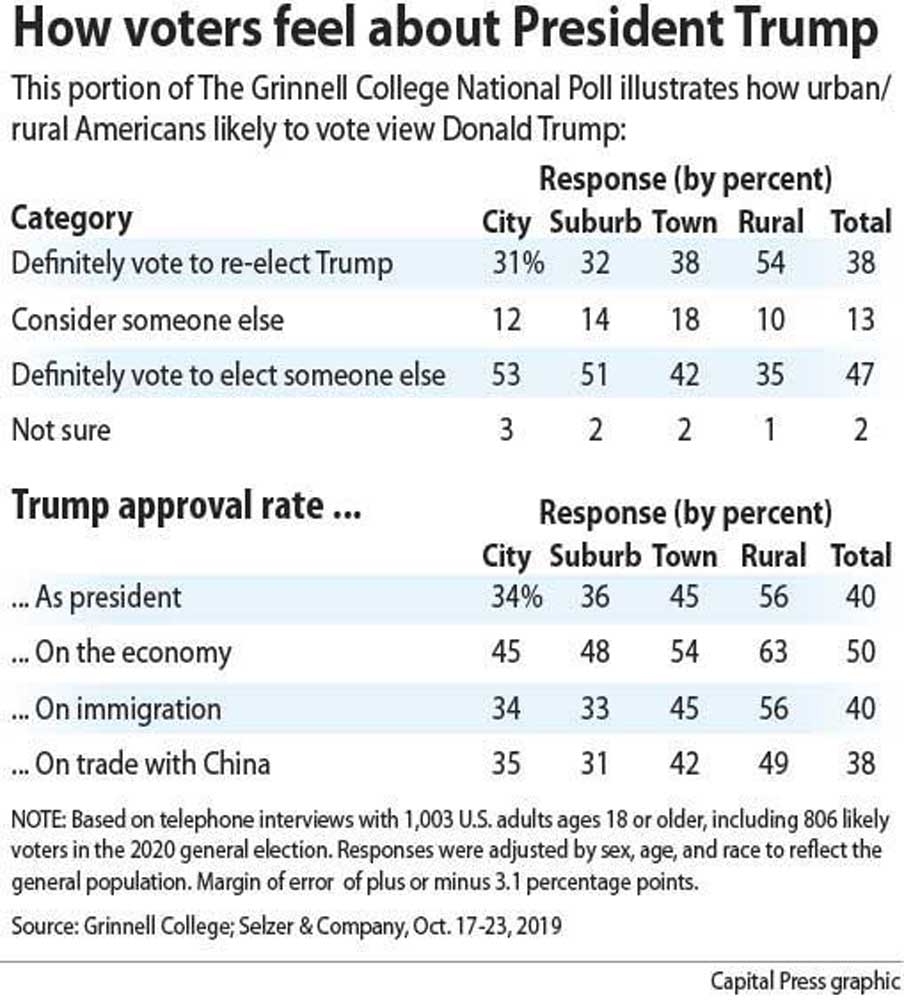Rural support for Trump remains steady
Published 5:00 am Thursday, December 12, 2019

- 191213_cp1_news_ak trump.polls
BUHL, Idaho — Three years ago, dairy farmer John Brubaker saw presidential candidate Donald Trump as the lesser of two evils.
Back then, Trump wouldn’t have been his first pick — but there was no way he’d vote for Hillary Clinton, the former U.S. senator and secretary of state under President Barack Obama.
Fast forward to a cold, windy day checking cows on his dairy, and it’s a different story — Trump is now his top choice.
“He has done a lot for rural America, and he has done a lot for the nation, in my opinion,” he said.
Brubaker, 65, is one of Trump’s many rural backers, a segment that helped push the New York real estate mogul and reality TV show boss over the top in the 2016 election. A recent poll by Grinnell College in Iowa shows that Trump’s approval rating among rural voters ranges from 56% to 63% on issues such as his performance as president, the economy and on immigration.
Voters’ one caveat is the trade war with China, which has cost U.S. farmers billions of dollars in an already severe agriculture economic recession. Even so, the poll showed a 49% approval rating on China.
Frustration over China and how long the trade dispute will linger has some questioning whether rural support for Trump will hold.
“There’s some real frustration and trepidation out there,” Brubaker said.
But any businessman in agriculture knows something had to be done, and Trump’s hard line on China hasn’t altered Brubaker’s support, he said.
“… It should have been done 20 to 30 years ago. He’s the only one with a backbone to do it,” he said.
That’s a rare quality in a U.S. president and a big reason Trump has his support, he said.
“You might not like what he says, but you know where he stands. He’s not going to be bought off,” he said.
Another aspect he likes about Trump is that he’s not a politician, he’s a businessman.
Trump has rolled back regulations, including Waters of the U.S., he said. Many in agriculture saw Waters of the U.S. as an attempt by the federal government to control nearly all surface water.
“What he understands is how regulation is a job-killer, and he’s all about American jobs,” he said.
He also appreciates Trump’s tough stance on immigration. It’s a two-edged sword because farmers need an immigrant work force, but it has to be done the right way, he said.
“We can’t just have people walk in here freely by the hundreds of thousands,” he said.
That’s not to say Brubaker agrees with every decision Trump has made. He doesn’t think standing up to China alone or pulling the U.S. out of the Trans-Pacific Partnership were the way to go.
The U.S. should have gotten a coalition of countries, and definitely the European Union, involved in standing up to China, he said.
As for the partnership, Trump wanted bilateral agreements instead, and he has procured an agriculture-focused agreement with Japan that mirrors the agreement.
But pulling out of it opened the doors to U.S. competitors in the other 11 markets, he said.
On the whole, Brubaker believes Trump has the farmer’s back, he said.
He’s done more for farmers, and the nation, than any president since Ronald Reagan, he said.
Strong support
There’s more to the equation than disruptions in trade, according to the American Farm Bureau Federation, which doesn’t endorse candidates.
Despite the frustration over trade, the Trump administration has brought about tax reform and rolled back regulations, Dale Moore, the federation’s executive vice president, said.
One big regulatory rollback was the EPA’s Waters of the U.S. rule, he said.
Farm bureau members he and his colleagues have talked with “still believe the president is out there fighting for them,” he said.
They also feel the administration is listening. Whether it’s the U.S. Department of Agriculture or the Department of the Interior, they feel they’re being heard. They like how agencies are approaching things and want to keep that going, he said.
They’re not always getting the answers they want, but folks are listening, he said.
One example is the trade mitigation and market facilitation programs, meant to compensate farmers and ranchers for lost income due to the trade dispute with China.
It’s not going to make farmers whole, but it is appreciated, he said.
Producers are “somewhere between frustrated and angry at the situation,” but they also realize “China is a bad actor and it’s gone on a long time,” he said.
Producers also felt the effects of pulling out of the Trans-Pacific Partnership, and getting the agreement with Japan is an important step forward — as is resolving the situation with China and getting the U.S.-Mexico-Canada Agreement ratified, he said.
There has also been progress on rural infrastructure and broadband internet expansion as well as a focus on the opioid crisis and mental health in rural communities, he said.
The rural sentiment toward healthcare is really tough to get a handle on, he said. Everybody has an issue trying to sort that out, particularly in rural areas, where so many people are self-employed, he said.
“Affordable insurance is going to be an ongoing issue,” he said.
Immigration reform is also an issue, as is the need to reduce the number of waivers under the Renewable Fuel Standard, he said. The administration exempted some small refineries from the biofuel mandate, upsetting corn producers.
While the farm economy is struggling, the economy in general has improved under the Trump administration — and that’s important to producers, he said.
What farm bureau is hearing from its state affiliates is “folks still support the president.” As one member put it — when it comes to farm bureau gatherings in his area “you complain about the president at your own peril,” he said.
People in rural communities feel Trump understands their issues, whereas the other presidential candidates are still trying to make inroads in rural areas, he said.
The rural vote was important in the last presidential election, and it’s going to be important in the 2020 elections, he said.
Rural voters accounted for 17% of the electorate in the 2016 elections and Trump carried 62% of the rural vote, according to exit polls.
Steady backing
Johnathan Hladik, policy director at the Center for Rural Affairs, said rural support for Trump appears to be steady.
The center is an independent, nonpartisan organization that advances policy to support small towns and family farmers.
“Based on what we’re hearing, support probably remains unchanged,” he said.
He doesn’t think it’s as enthusiastic as portrayed by some media. But Trump voters are still willing to see the best in him, and he doesn’t think they’ll turn on him.
Trump has made some mistakes, and people see that. But he’s also done some good things, he said.
“They feel that he’s at least trying to get things done, and that’s a contrast compared to Congress,” he said.
The administration has just sent out the second installment of trade mitigation aid, and that’s top of mind right now, he said.
“I think this says to a lot of farmers this is an administration that understands they’re in a rough spot. They see it as a recognition of the challenges on the farm and what they’ve been through,” he said.
And they think someone’s in charge who is at least willing to improve trade. There’s a sense that something will get done with China and the U.S.-Mexico-Canada Agreement, he said.
There are lots of issues in rural areas, from access to health care to the quality of jobs and economic opportunity. Anecdotally, people are certainly struggling despite low unemployment rates, he said.
“The rural economy hasn’t rebounded the way it has in other parts of the country. But I don’t know if people attribute that to the president,” he said.
They do, however, attribute the refinery waivers under the Renewable Fuels Standard to the Trump administration — again, a big deal for corn growers.
But from things Trump has said, he realizes that was a mistake and will fix it, he said.
Trump does a good job of speaking to voters and assuring them they just need to be patient, he said.
“He’s good enough at messaging that people who support him in rural areas are not willing to turn their back on him,” he said.
Not unanimous
While many rural voters appear to support the president, the feeling is not unanimous.
For those in farm country who oppose Trump, trade is a major concern.
“I suspect there will be declining enthusiasm” for Trump, said Roger Johnson, president of the National Farmers Union, which represents 200,000 farmers and ranchers. “Who knows what’s going to happen with China? China’s the big one. … A few years back, China was our No. 1 agricultural market for several years. It has just dropped off the cliff, and is four, five or six, depending on how you tally it.”
Johnson said that as a result of the dispute China has also shifted its trade patterns to rely less on the U.S. for agricultural commodities.
“They’ve done major investments in South America, in the infrastructure so they could continue to get their ag products from there,” Johnson said. “They’re doing the same thing, particularly in Eastern Europe. So there’s more land opening up. That land is not going to go back out of production once we settle” these trade disputes.
Overall, Johnson said, “I think there has been enormous damage done to our reputation around the world. … I think our reputation is in tatters around the world and I think, for the rest of my lifetime, we will be viewed as a residual supplier by the rest of the world.”
Impeachment factor
The U.S. House of Representatives appears to be on track to vote on articles of impeachment, centered on Trump’s dealings with Ukraine, before the end of the year. However, the matter will ultimately be decided by the Republican-dominated Senate.
Overall, the impeachment sentiment in rural communities is one of disappointment, Hladik said.
“People think it’s a waste of money and a waste of time,” he said.
They view it as another example of partisanship, he said. “People see this as a partisan play and are turned off by that.”
Dairyman Brubaker is of the same sentiment and thinks the impeachment effort doesn’t stand a chance.
“I think it’s a waste of time and money,” he said.









